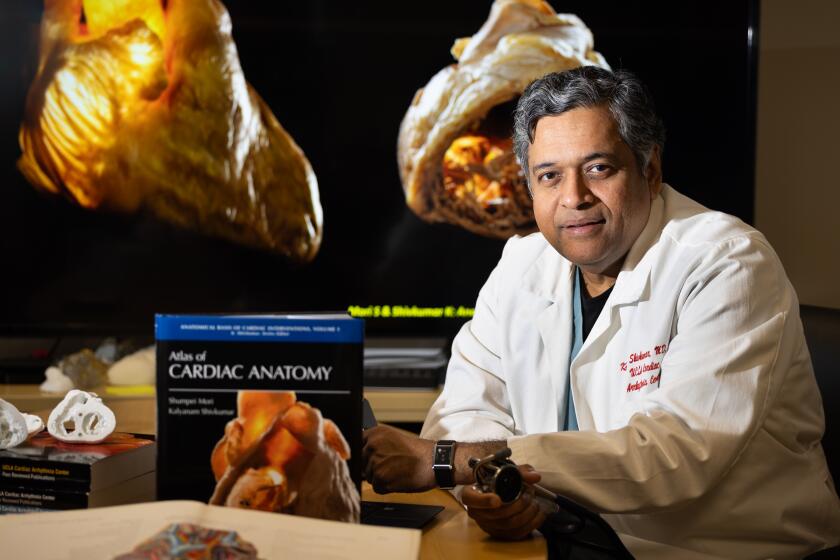Genes have a big say on fatty foods
Cutting back on saturated fats -- found in red meat and dairy products -- may not reduce our risk of heart attacks as much as we thought. It may be our genes that determine whether the fat in hamburgers, cheese and ice cream are actually bad for our hearts.
Research published in the Oct. 21 issue of Circulation: Journal of the American Heart Assn. reveals that, in people with a normal form of the hepatic lipase gene, levels of protective HDL cholesterol increase slightly when eating a diet laden with saturated fat. (HDL, or high-density lipoprotein, reduces the risk of heart attack by carrying fatty deposits away from arterial walls.)
Those with a mutation on the hepatic lipase gene aren’t so fortunate.
In them, the study showed, a diet high in saturated fats dramatically lowers the level of HDL in the blood, leaving them exposed to a higher risk of heart attacks.
The findings help explain why some people can eat “whatever they like” and experience no ill effects on their cholesterol levels, while others believe they have only to look at a bowl of ice cream to have problems with cholesterol.
The research also sheds light on why some people respond positively to reductions in saturated fat while others do not.
The study’s authors say that it is too soon to recommend widespread genetic testing to determine our hepatic lipase gene status.
When it does become possible, however, doctors will be able to offer individually tailored nutritional advice that could dramatically reduce the risk of heart disease.
Until then, the American Heart Assn.’s recommendation that we all cut back on saturated fats remains sound advice. Because, although it may not improve everyone’s level of good cholesterol, a new Australian study shows it may have another heart-friendly benefit -- helping us acquire a trim waist.
Scientists at Curtin University of Technology in Perth, Australia, have found that eating more monounsaturated fats -- found in olive oil, nuts and seeds -- may help us gradually slim down.
Their discovery came from a study in which they fed a group of men two different breakfasts on two separate days. While both breakfasts supplied the same amount of calories and total grams of fat, the fat came from monounsaturated olive oil on one day and saturated fat-rich cream on the other.
For up to five hours after the olive oil-rich breakfast, the researchers discovered, the men burned fat in their bodies significantly faster than after the cream-rich breakfast. The difference in fat-burning rates was large enough for researchers to conclude that a simple switch from a diet rich in saturated fat to one higher in monounsaturated fat may have beneficial effects in curbing weight gain.
In practice this would mean, for example, giving up mayonnaise in favor of olive oil, having extra lean steak (rather surprisingly, 50% of its fat is monounsaturated) instead of burgers, and munching nuts and seeds as snacks in place of crisps, tortilla chips and cookies.
*
Amanda Ursell, a dietitian and nutritionist, is a London-based journalist. Her column appears on the first Monday of the month. She can be reached at amanda@ursell.com.



